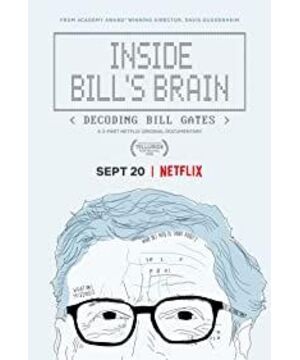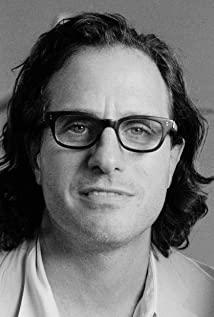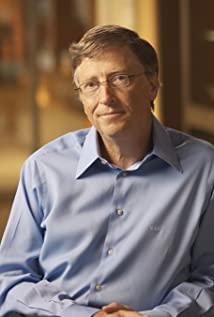Inside Bill's Brain: Decoding Bill Gates (Chinese name "Decoding Bill Gates") is a documentary filmed by Netflix not long ago. I squeezed time last weekend and finally finished it.
Inside Bill's Brain doesn't organize the entire film by amplifying Bill's philanthropic work, as many media have claimed, although it is a thread that runs through it. This documentary still sticks relatively strictly to the definition given by the title: to explore the way of thinking behind Bill, not just show his achievements, in order to pile up a gorgeous PR film.
If I think about it from this angle, it can explain my intuitive feeling after watching it for the first time: there are not too many moving and emotional fluctuations, but a series of undercurrents contained in the silence. Because Bill's way of thinking is the typical way of thinking of science and engineering people and geeks, systematically "step by step" plus inexplicable "death to the end". Persevere and unleash all of Bill's abilities and beliefs one by one in the course of his life.
If philanthropy is a human, ethical, and emotional thing, an easy inference to make is whether philanthropy should be a deepening or radicalization of these ideas and beliefs. But Bill doesn't follow this line of reasoning. Instead, he sees the problem entirely in terms of what he is good at engineering: how philanthropy can maximize existing resources to improve human well-being around the world.
(According to him, the hammer in his hand is the engineering ability, so all problems will be treated as nails, that is, according to the engineering way of thinking. This is a very interesting reversal of the "hammer and nail story" example of use.)
With this most basic problem perspective, all the work that follows is naturally laid out in an engineering way: what are the specific goals of this optimization problem, and what are all their constraints. Each limitation, in turn, can be boiled down to which sub-problems. Who are the top researchers on these sub-questions today, and what are their opinions and reflections. Can you combine ideas from different fields to overcome this problem? If the sub-problem cannot be solved, continue the above steps, continue to decompose, and continue to find new information to ingest, so as to promote the further decomposition and digestion of the problem. What you need to do is to continuously advance the iteration of the above process with high fighting spirit and tenacious willpower.
This Netflix documentary is divided into three parts, which correspond to Bill's investment in three major things:
- Restoration of toilets dedicated to eradicating diarrhea (dysentery).
- Invest tens of billions of dollars to completely eliminate Polio (polio, also known as polio).
- Create TerraPower to provide an absolutely safe way to supply energy from nuclear reactors.
These three things were chosen, from Bill's point of view, because of their very nature to maximize their input effect. Either can save the most lives with the lowest input cost. Either it is because the subject itself is very difficult, and without his intervention, without the intervention of someone like him who can invest tens of billions in himself, this problem cannot be solved at all. According to the goal of engineering optimization, iterative steps in a scientific and systematic way: finding information, decomposing problems, trying potential solutions, and continuing to cycle forward. However, the solution of these three problems is mixed:
- The renovation of the toilet is expensive, but there is some hope.
- Polio, with tens of billions of dollars invested, was almost wiped out. But it was forcibly interrupted by the invasion of terrorists. As a result, the number of Polio cases, which were already under control, increased again.
- TerraPower personnel have found an elegant solution, and also found China, an important manufacturing partner, but were forced to fail by the sweater (please read four times) and live.
The interviewer finally challenged Bill and asked: Does this mean that the questions themselves are too difficult, and you've done enough, you should quit.
Instead of giving a direct answer, Bill gave an aphoristic statement: Sometimes, you have to say, let's give up. And sometimes, you have to say, I should have worked harder.
The narrator states that when faced with extremely difficult questions, Bill always chooses the latter option.
Perhaps such a dialogue will give people a strong emotional impact, as if a person is doing Sisyphus-like things, as if this is something a saint can do. But I want to explain this insistence from another angle.
Melinda couldn't help laughing when the interviewers started repeating the show's title, Inside Bill's Brain , to Bill's wife, Melinda, at the beginning of the second episode. The interviewer is weird, what's wrong with the name? Melinda replied: I don't want to get into my husband's head. why? Because there is nothing but chaos.
Melinda went on to say that Bill loves complexity, and the more complex the problem, the more exciting it is. And Bill himself has said that his worst fear is that his brain stops working. He really enjoys using his brain to think deep and strange at the same time. He enjoys solving complex problems.
Whether it's just getting started with computers in high school to solve complex class assignments, getting through the thorns of building Microsoft, or now devoting himself to philanthropy, for Bill, it's just what he's dealing with that he enjoys Just a complex issue. For people who do technology, when you devote yourself to solving a problem, the problem will haunt you and you will be forced to constantly think about it and struggle with it. Giving up is never an option you can accept. It's not because you don't want to give up subjectively, but because this question will automatically jump into your brain, disturbing your mind and forcing you to continue thinking about it.
So from my point of view, Bill's commitment to philanthropy is in keeping with the techie personality he's always held. In fact, there is no need to have so many emotional elements and elements of the halo of saints, work harder and keep going, this is just the natural choice of thousands of technicians.
This reminds me of another story shared by my friend J. One of J's former friends ridiculed his choice to read Phd: Reading Phd is stupid, how many people can invent many awesome algorithms? This is completely impossible.
However, this view is completely different from the way Bill does things in the documentary, and the way the experts Bill finds do things. Nathan Myhrvold, author of the 2600+ page 5-volume book: Writings on Bread, has written about the speed of dinosaur tail swings. Vaclav Smil, who has written dozens of books on energy, spent his life researching every tiny topic about energy to frame the entire energy research. And he never cared whether the books he wrote were read by readers. The reason is that writing is his way of sorting out his perception of the world, it's just his personal way of learning.
From what these people do, they can give people more encouragement and disenchantment of the halo, innovation and creation. It is not a mysterious and unattainable thing, it is just a natural thing like going to the toilet.
I think, for me, exploring the way of thinking behind Bill has given me more inspiration to focus on my goals, do things in the way I am good at, and figure out what subway I want to transfer to (" People are small, the world is big, and others are busy "), just do it.
recent review
" When we trace source code, to what extent do we trace it? "" Busy and the first cosmic speed " " Life is not a chess game, but a poker game "
If you like my article or share, please long press the QR code below to follow my WeChat public account, thank you!
For more information exchange and viewpoint sharing, you can join Knowledge Planet:
View more about Inside Bill's Brain: Decoding Bill Gates reviews









